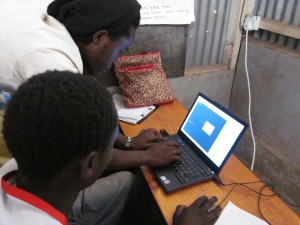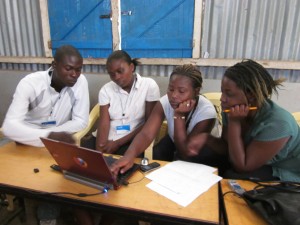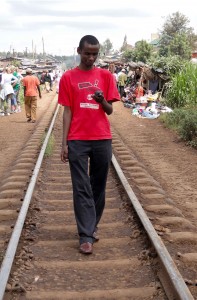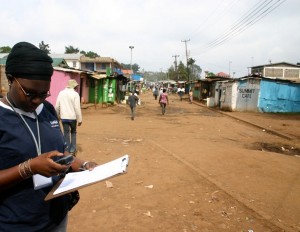by: jamie September 15th, 2011 comments:

Training youth mappers in Mukuru
It’s not if but when, And the when took place this Monday morning. A KPC pipeline – that runs through Nairobi’s informal settlement of Mukuru – exploded, taking with it the lives of 95+ people who live, work, school and play near in one of the marginal areas of the sprawling metropolis of Nairobi city.
Kenyans have been discussing the pipeline disaster and have been analyzing the factors that led up to the event. On Tuesday, both the Standard and the Daily Nation ran 11 pages of coverage of the event. It’s not surprising that journalists have in the past covered the precarious situation residents of the Sinai village face. There is often coverage of other dangerous conditions Nairobi residents live in – such as those living along the railway or high voltage power line in Kibera, or the polluted river in Mathare, or the dumping site in Dandora.
Many are not aware that the Sinai village (referred to in the media as Sinai slum or Lunga Lunga slum) is one village in the larger informal settlement of Mukuru. Mukuru is located in Nairobi’s industrial area. Access to the area is facilitated by roads that lead along the backs of factories and warehouses and industrial workvsites. The dangers of living in Mukuru slum are apparent as factories bellow out smoke, trucks carrying hazardous materials rumble by and pipes and electrical towers dot the landscape.
For the past 2 months, the Map Kibera Trust team have been working with youth in Mukuru. The “Map Mukuru†project began with funding from Unhabitat’s Youth Fund and interest from young people in Mukuru who we had worked with in 2010, with funding from HIV Free Generation.
The Map Kibera team has been engaged is a long-term process of skills building for young people in Nairobi’s informal settlements of Kibera, Mathare and now Mukuru. The Mukuru project is being run almost entirely by young mappers from Kibera – we’ve taken the opportunity of receiving the youth fund grant to push the Kibera youth to manage the project on their own and to exchange skills and learn from other young people.

Maureen Omino from Kibera trains mappers in Mukuru
The team is saddened by the tragic event in Sinai. The event hit some of our mappers quite hard – they were in the field in the area of the blast the previous week and were thankful that we were inside, editing data at the time of the explosion. None of the mappers were injured during the explosion but some lost friends in the fire and we send our condolences to the families and friends of the victims.
Our mapping work however is not a reaction to any singular event – it is a long-term effort aimed at amplifying the voices of residents of informal settlements. Our mission is to increase their representation and influence in decision making processes. By training young people as mappers and digital storytellers, we hope we are contributing to community resilience, not just to respond to disasters like the Sinai fire tragedy, but to ultimately reduce the risk to resident in informal settlements through identifying solutions to ongoing problems and dangers in the local environment.
by: jamie August 23rd, 2011 comments:
On August 16th, Map Kibera Trust posted about the bonus day on Global Giving’s August Open Challenge. We are pleased to announce that in 1 day we raised $990 from 18 donors, and received $82 in matched funding from Global Giving! Thanks to all of you who donated on that day, and throughout the challenge. We are honoured to have your support!
NOW we have 8 days left to raise $1,485 to complete our fundraising goal of $4,000. To date we have raised $2,515 towards our goal (with a bonus of $82 from the bonus day fundraising efforts).
Please share this widely – Map Kibera needs your support to Turn Maps into Action in Kibera!

Zack Wambua maps the railway line in Kibera
by: jamie August 16th, 2011 comments:
Map Kibera Trust put Kibera on the world map! Our team of community mappers plan to bring the map information to local change agents in the community, through printed atlases and map murals throughout Kibera.
To support our work, we are currently participating in the Global Giving August Open Challenge. During the challenge, we have 4 weeks (August 2nd – August 30th) to raise $4,000 from 50 unique donors. To date, Map Kibera has raised $1,685 from 24 amazing supporters. Get involved and help us meet our goal so that we can print maps and paint wall “map murals” to share information in Kibera.
Follow this link to give today! (P.S. Today (August 16th) is Bonus day on the challenge each donation will be matched by an extra 15% by Global Giving!).
Read on below to hear about our project.

What is the issue, problem, or challenge?
Kibera, in Nairobi, Kenya, is a slum housing some 250,000 people. Kibera is likely the most photographed, researched, and well-known slum in the world. Before October 2009 however, Kibera did not appear on the world map. Map Kibera trained thirteen youth from the slum to use GPS devices to map points of interest in their community, such as clinics, water sources, landmarks, toilets, street lights, and businesses. The youth will now reach out the the community and 200 change agents with the maps.
How will this project solve this problem?
The Map Kibera team wants to make sure that the local community is part of discussions about the challenges facing slum residents around the word. This project will reach out to local change agents to distribute the maps and discuss how geographic information and open data can be used to improve project delivery and development in Kibera and other slums around the world.
Potential Long Term Impact
We will reach out to 200 change agents around Kibera to discuss how community generated information can improve the delivery of services and the implementation of projects in Kibera.
Project Message
“The training and the whole process of mapping has changed me…I feel much more confident and well informed…I will not leave Kibera but will stay and make it a better place to live.”
– Regynnah Awino, Kibera mapper
Update: it’s 50 unique donors, rather than 40. Thanks!



